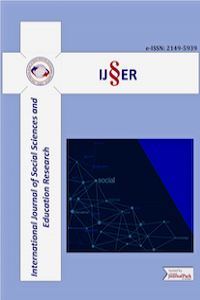Koronavirüs (Covid-19) salgınının Türkiye'de turizm üzerindeki öncülleri, etkileri ve sonuçlarının değerlendirilmesi
Turizm, Covid-19, salgın, otel, tur operatörü, seyahat acentası, havayolu, Koronavirüs
The evaluation of the antecedents, effects, and consequences of Coronavirus (Covid-19) pandemic on tourism in Turkey
Tourism, Coronavirus, Covid-19, pandemic, hotel, tour operator, travel agency, airline,
___
Bakar, N. A., & Rosbi, S. (2020). Effect of Coronavirus disease (COVID-19) to tourism industry. International Journal of Advanced Engineering Research and Science, 7(4).Baldwin, R., & Tomiura, E. (2020). Thinking ahead about the trade impact of COVID-19. Economics in the Time of COVID-19, 59.
Barua, S. (2020). Understanding Coronanomics: The economic implications of the coronavirus (COVID-19) pandemic. Manuscript.
Bişkin, C. (2020). Gün gün coronavirus salgınının turizme yansımaları. https://www.turizmgunlugu.com/ (E.T: 18.04.2020).
Boone, L., Haugh, D., Pain, N., & Salins, V. (2020). 2 Tackling the fallout from COVID-19. Economics in the Time of COVID-19, 37.
Craven, M., Liu, L., Mysore, M., & Wilson, M. (2020). COVID-19: Implications for business. McKinsey & Company.
Cucinotta D, Vanelli M. (2020). WHO Declares COVID-19 a Pandemic. Acta Biomedica, 91(1),157-60. https://doi.org/10.23750/abm.v91i1.9397
Demir, M. (2017). Seyahat acentacılığı ve tur operatörlüğü: İlkeler ve yönetim. Ankara: Detay Yayıncılık.
Demir, Ş. Ş. (2011). Turizm işletmelerinde halkla ilişkiler ve iletişim. Detay Yayıncılık.
Diyanet İşleri Başkanlığı (2020). Diyanet İşleri Başkanı Erbaş, koronavirüsle ilgili tedbirleri açıkladı. https://www.diyanet.gov.tr/en-US/News/Index/17 (E.T: 15.04.2020).
Dyer, O. (2020). Trump claims public health warnings on covid-19 are a conspiracy against him. bmj, 368, m941.
Fearn-Banks, K. (2016). Crisis communications: A casebook approach. Routledge.
Fernandes, N. (2020). Economic effects of coronavirus outbreak (COVID-19) on the world economy. Available at SSRN 3557504.
Ghebreyesus, T.A. (2020). WHO Director-General's opening remarks at the media briefing on COVID-19. https://www.who.int/dg/speeches/detail/who-director-general-s-opening-remarks-at-the-media-briefing-on-covid-19---11-march-2020 (E.T: 22.03.2020).
Gössling, S., Scott, D., & Hall, C. M. (2020). Pandemics, tourism and global change: a rapid assessment of COVID-19. Journal of Sustainable Tourism, 1-20.
Guba, E. G. (1981). Criteria for Assessing the Trustworthiness of Naturalistic Inquiries, Educational Communication and Technology: A Journal of Theory, Research, and Development, 29 (2): 75- 91
Gülal, S. (2020). Turizm Bakanı Ersoy’dan önemli coronavirus açıklaması. https://www.turizmgunlugu.com/ (E.T: 19.04.2020).
Hâkimler ve Savcılar Kurulu (2020). Corona Virüsü Hakkında Alınacak Tedbirler. https://www.hsk.gov.tr/DuyuruArsivi.aspx (E.T: 19.04.2020).
Henderson, J. C. (2007). Tourism crises: causes, consequences and management. Routledge.
Higgins-Desbiolles, F. (2020). Socialising tourism for social and ecological justice after COVID-19. Tourism Geographies, 1-14.
Ho, C. S., Chee, C. Y., & Ho, R. C. (2020). Mental health strategies to combat the psychological impact of COVID-19 beyond paranoia and panic. Ann Acad Med Singapore, 49(1), 1-3.
Hoque, A., Shikha, F. A., Hasanat, M. W., Arif, I., & Hamid, A. B. A. (2020). The Effect of Coronavirus (COVID-19) in the Tourism Industry in China. Asian Journal of Multidisciplinary Studies, 3(1), 52-58.
ILO (2020). COVID-19 ve turizm sektörü. https://www.ilo.org/ankara/areas-of-work/covid-19/WCMS_742721/lang--tr/index.htm (E.T: 17.04.2020).
Jia, Z., Shi, Y., Jia, Y., & Li, D. (2012). A framework of knowledge management systems for tourism crisis management. Procedia Engineering, 29, 138-143.
Jóhannesson, G. T., & Huijbens, E. H. (2010). Tourism in times of crisis: exploring the discourse of tourism development in Iceland. Current Issues in Tourism, 13(5), 419-434.
Karanfil, N. (2020). Son dakika... Corona virüs destekleri peş peşe geldi! Hangi banka hangi fırsatları sunuyor? https://www.hurriyet.com.tr/ (E.T: 19.04.2020).
Lovelace B. (2020). World Health Organization names the new coronavirus: COVID-19. https://www.cnbc.com/(E.T: 19.04.2020).
Manderson, L., & Levine, S. (2020). COVID-19, Risk, Fear, and Fall-out. https://doi.org/10.1080/01459740.2020.1746301
Maxwell, J. A. (1996). Qualitative Research Design: An Interactive Approach. California: SAGE Publications.
Maxwell, J.A. (1992). Understanding and validity in qualitative research. Harvard Educational Review, 62, 979-1000.
McKibbin, W. J., & Fernando, R. (2020). The global macroeconomic impacts of COVID-19: Seven scenarios. CAMA Working Paper No. 19/2020
Pforr, C., & Hosie, P. J. (2008). Crisis management in tourism: Preparing for recovery. Journal of Travel & Tourism Marketing, 23(2-4), 249-264.
Resmi Gazete (2020). Ceza Ve Güvenlik Tedbirlerinin İnfazı Hakkında Kanun İle Bazı Kanunlarda. Değişiklik Yapılmasına Dair Kanun. Kanun No. 7242 Kabul Tarihi: 14/4/2020.
Ritchie, B. W. (2004). Chaos, crises and disasters: a strategic approach to crisis management in the tourism industry. Tourism management, 25(6), 669-683.
Ruiz Estrada, M. A., Park, D., & Lee, M. (2020). The Evaluation of the Final Impact of Wuhan COVID-19 on Trade, Tourism, Transport, and Electricity Consumption of China. Tourism, Transport, and Electricity Consumption of China (March 9, 2020).
Sigala, M. (2011). Social media and crisis management in tourism: Applications and implications for research. Information Technology & Tourism, 13(4), 269-283.
Sułkowski, Ł. (2020). Covid-19 Pandemic; Recession, Virtual Revolution Leading to De-globalization?. Journal of Intercultural Management, 12(1), 1-11.
Şener, S. vd. (2017). Turizm Alanındaki Nitel Araştırmaların Güvenirlik ve Geçerlik Ölçütleri Kapsamında Değerlendirilmesi. Anatolia: Turizm Araştırmaları Dergisi, 28, 1, 7-26
T.C. Milli Eğitim Bakanlığı (2020). Bakan Selçuk, Koronavirüs'e Karşı Eğitim Alanında Alınan Tedbirleri Açıkladı. http://www.meb.gov.tr (E.T: 19.04.2020).
T.C. Millî Savunma Bakanlığı (2020). Bakan Akar, Koronavirüs’e Karşı Alınan Tedbirleri Açıkladı. https://www.msb.gov.tr (E.T: 19.04.2020).
T.C. Sağlık Bakanlığı (2020). Türkiye Günlük Koronavirüs Tablosu. https://covid19.saglik.gov.tr/ Yükseköğretim Kurulu (2020). Koronavirüs (Covid-19) Bilgilendirme Notu: 1. https://www.yok.gov.tr (E.T: 19.04.2020).
Zheng, Y., Goh, E., & Wen, J. (2020). The effects of misleading media reports about COVID-19 on Chinese tourists’ mental health: a perspective article. Anatolia, 1-4.
- Yayın Aralığı: Yılda 4 Sayı
- Başlangıç: 2015
- Yayıncı: Mahmut DEMİR
Coronavirüsün (Covid-19) turizm sektörü üzerindeki ekonomik etkileri
Mahmut DEMİR, Yusuf GÜNAYDIN, Şirvan Şen DEMİR
İslamofobi ve medya: “The Stone Merchant” film afişinin göstergebilimsel analizi
Nurettin GÜZ, Mahmut BİNGÖL, Hayrullah YANIK
Akademisyen dijitalleşme ölçeği geliştirilmesi
Son ile başlangıç arasında kalmış bir durum: Ölüm algısı
Gamze TESKERECİ, Adem SÜMEN, Abdullah ESİRGENLER, Şiva ABDULLAH
Turizm öğrencilerinin turizm bilinci ile ilgili algıları
Bilim ve Sanat Merkezi (BİLSEM) öğrencilerinin ahlaki olgunluk düzeylerinin incelenmesi
Türkiye’nin COVID-19 pandemisi sırasında yaptığı uluslararası insani yardımların kavramsal çerçevesi
